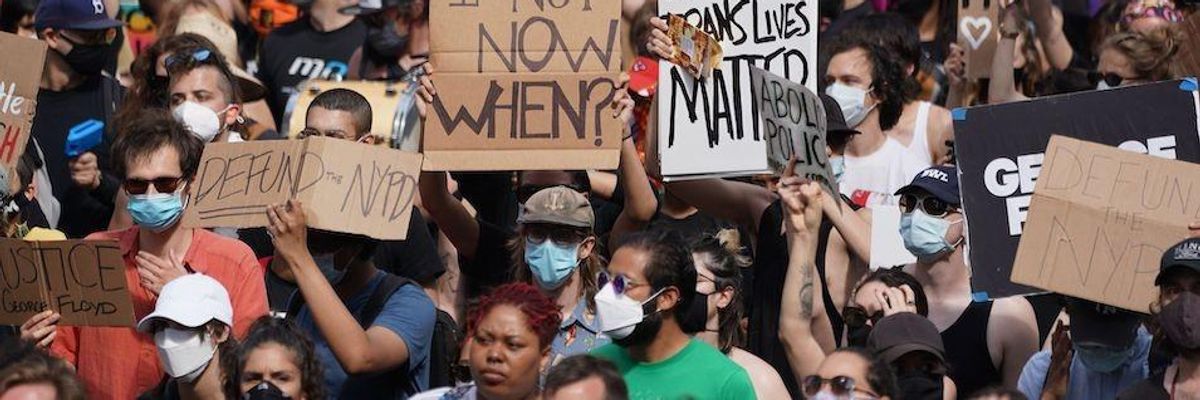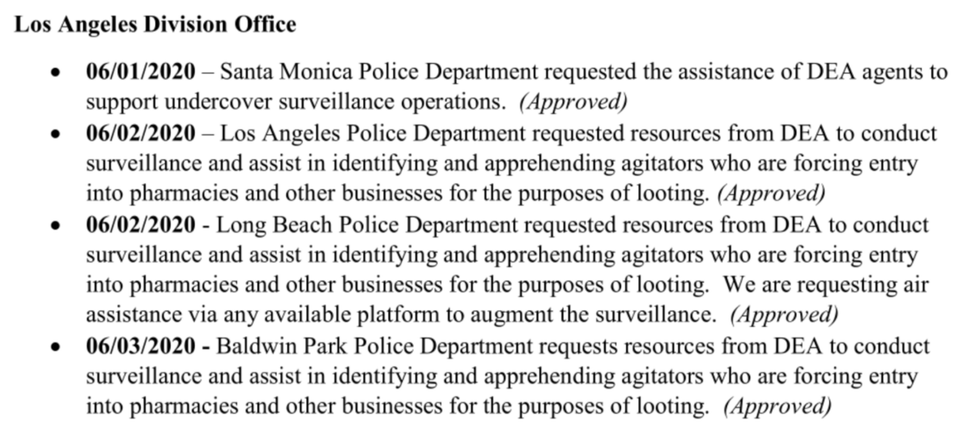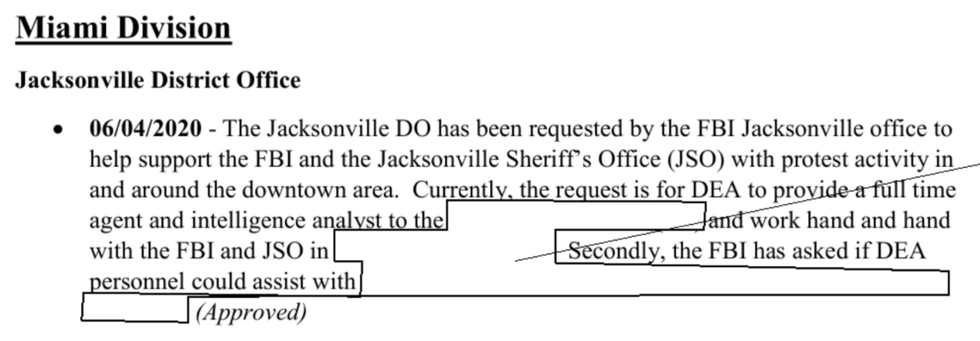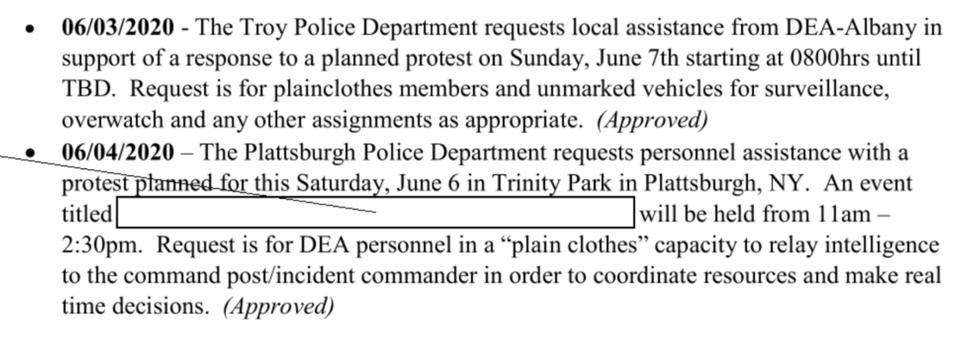

SUBSCRIBE TO OUR FREE NEWSLETTER
Daily news & progressive opinion—funded by the people, not the corporations—delivered straight to your inbox.
5
#000000
#FFFFFF
To donate by check, phone, or other method, see our More Ways to Give page.


Daily news & progressive opinion—funded by the people, not the corporations—delivered straight to your inbox.

Protesters march through lower Manhattan over the death of George Floyd by Minneapolis Police on June 19, 2020. (Photo: Bryan R. Smith/AFP/Getty Images)
The Drug Enforcement Administration approved at least 51 requests from state, local, and federal law enforcement agencies to conduct covert surveillance during racial justice protests last summer, according to records obtained by CREW. The nationwide surveillance operation occurred in cities including Los Angeles, Tampa, Denver, and St. Louis, and involved agents infiltrating crowds undercover, as well as aerial and vehicular surveillance to monitor protesters.
The operations were part of a two-week expansion of the DEA's domestic surveillance authority by Justice Department leadership in June 2020, as first reported by BuzzFeed News. An initial release of records, obtained by CREW in an ongoing Freedom of Information Act lawsuit, detailed DEA's surveillance efforts in Philadelphia, Chicago, and Albuquerque.
\u201cThis is a big deal. The DEA approved more than 50 requests from state and local agencies to spy on protestors last summer--far more than previously known. \nhttps://t.co/FUNzG7Qo2N\u201d— Citizens for Ethics (@Citizens for Ethics) 1633458630
The new records reveal the full scope of the DEA's surveillance operations last summer. While some agencies sought DEA's help with apprehending people suspected of theft or looting, CREW counted at least 51 instances where agencies enlisted DEA to secretly monitor protesters engaged in First Amendment-protected activity.
In California, the DEA approved surveillance requests submitted to its Los Angeles Division Office by police departments in Santa Monica, Los Angeles, Long Beach, and Baldwin Park. The Santa Monica Police Department specifically sought "the assistance of DEA agents to support undercover surveillance operations."

In Florida, the DEA approved a request submitted to its Tampa District Office by the University of South Florida Police Department for "undercover DEA Special Agents" to pose as "members of a scheduled 'vigil'" on June 12 at the university's Martin Luther King, Jr. Plaza. Press reports show that the vigil was peaceful and proceeded without incident.

The DEA also approved a request from the Jacksonville Sheriff's Office to provide a "full time agent and intelligence analyst" to work "hand in hand" with officers.

In some cities, the DEA provided aircraft surveillance to local divisions and police departments. The Denver Police Department requested DEA "aerial support" to monitor planned protests for up to two days.

U.S. Customs and Border Protection's Air division requested the assistance of DEA's San Antonio District Office "to conduct surveillance during a protest scheduled for...June 2."

On June 2, the St. Louis Police Department requested surveillance-related support for "rioting/looting." They followed up the next day with an updated request for aerial support.

Many cities requested that DEA agents monitor protests from within while undercover. Two police departments in upstate New York requested that DEA agents dress in "plain clothes."

In New Jersey, the Newark Police Department and Essex County Sheriff's Office requested that the DEA conduct surveillance to "identify protest leaders and agitators who are inciting violence." Similarly, records obtained by CREW in April show that law enforcement officers in Philadelphia requested that the DEA identify protest leaders.

In Nevada, the DEA approved the Reno Police Department's May 30 request "to assist in providing intelligence on the movement of protesters." They followed up with another request on June 5 for "static and mobile surveillance" and covert vehicle intelligence gathering support.

Similarly, the Asbury Park Police Department in New Jersey requested "mobile/vehicular surveillance" to "provide intelligence on agitators and radical groups such as [redacted]."

The records also provided additional insight into DEA's previously reported surveillance activities in Chicago and Albuquerque.
The stark difference between federal law enforcement's preparations for racial justice protests last summer and the failures in preparation for the white nationalist attack on our Capitol on January 6 demands close scrutiny. The full extent of protester surveillance must be made public to prevent future politically motivated responses and abuses by law enforcement. If culpable individuals and institutions are not held accountable, they will continue to maintain harmful policies and systems at the expense of communities of color.
Trump and Musk are on an unconstitutional rampage, aiming for virtually every corner of the federal government. These two right-wing billionaires are targeting nurses, scientists, teachers, daycare providers, judges, veterans, air traffic controllers, and nuclear safety inspectors. No one is safe. The food stamps program, Social Security, Medicare, and Medicaid are next. It’s an unprecedented disaster and a five-alarm fire, but there will be a reckoning. The people did not vote for this. The American people do not want this dystopian hellscape that hides behind claims of “efficiency.” Still, in reality, it is all a giveaway to corporate interests and the libertarian dreams of far-right oligarchs like Musk. Common Dreams is playing a vital role by reporting day and night on this orgy of corruption and greed, as well as what everyday people can do to organize and fight back. As a people-powered nonprofit news outlet, we cover issues the corporate media never will, but we can only continue with our readers’ support. |
The Drug Enforcement Administration approved at least 51 requests from state, local, and federal law enforcement agencies to conduct covert surveillance during racial justice protests last summer, according to records obtained by CREW. The nationwide surveillance operation occurred in cities including Los Angeles, Tampa, Denver, and St. Louis, and involved agents infiltrating crowds undercover, as well as aerial and vehicular surveillance to monitor protesters.
The operations were part of a two-week expansion of the DEA's domestic surveillance authority by Justice Department leadership in June 2020, as first reported by BuzzFeed News. An initial release of records, obtained by CREW in an ongoing Freedom of Information Act lawsuit, detailed DEA's surveillance efforts in Philadelphia, Chicago, and Albuquerque.
\u201cThis is a big deal. The DEA approved more than 50 requests from state and local agencies to spy on protestors last summer--far more than previously known. \nhttps://t.co/FUNzG7Qo2N\u201d— Citizens for Ethics (@Citizens for Ethics) 1633458630
The new records reveal the full scope of the DEA's surveillance operations last summer. While some agencies sought DEA's help with apprehending people suspected of theft or looting, CREW counted at least 51 instances where agencies enlisted DEA to secretly monitor protesters engaged in First Amendment-protected activity.
In California, the DEA approved surveillance requests submitted to its Los Angeles Division Office by police departments in Santa Monica, Los Angeles, Long Beach, and Baldwin Park. The Santa Monica Police Department specifically sought "the assistance of DEA agents to support undercover surveillance operations."

In Florida, the DEA approved a request submitted to its Tampa District Office by the University of South Florida Police Department for "undercover DEA Special Agents" to pose as "members of a scheduled 'vigil'" on June 12 at the university's Martin Luther King, Jr. Plaza. Press reports show that the vigil was peaceful and proceeded without incident.

The DEA also approved a request from the Jacksonville Sheriff's Office to provide a "full time agent and intelligence analyst" to work "hand in hand" with officers.

In some cities, the DEA provided aircraft surveillance to local divisions and police departments. The Denver Police Department requested DEA "aerial support" to monitor planned protests for up to two days.

U.S. Customs and Border Protection's Air division requested the assistance of DEA's San Antonio District Office "to conduct surveillance during a protest scheduled for...June 2."

On June 2, the St. Louis Police Department requested surveillance-related support for "rioting/looting." They followed up the next day with an updated request for aerial support.

Many cities requested that DEA agents monitor protests from within while undercover. Two police departments in upstate New York requested that DEA agents dress in "plain clothes."

In New Jersey, the Newark Police Department and Essex County Sheriff's Office requested that the DEA conduct surveillance to "identify protest leaders and agitators who are inciting violence." Similarly, records obtained by CREW in April show that law enforcement officers in Philadelphia requested that the DEA identify protest leaders.

In Nevada, the DEA approved the Reno Police Department's May 30 request "to assist in providing intelligence on the movement of protesters." They followed up with another request on June 5 for "static and mobile surveillance" and covert vehicle intelligence gathering support.

Similarly, the Asbury Park Police Department in New Jersey requested "mobile/vehicular surveillance" to "provide intelligence on agitators and radical groups such as [redacted]."

The records also provided additional insight into DEA's previously reported surveillance activities in Chicago and Albuquerque.
The stark difference between federal law enforcement's preparations for racial justice protests last summer and the failures in preparation for the white nationalist attack on our Capitol on January 6 demands close scrutiny. The full extent of protester surveillance must be made public to prevent future politically motivated responses and abuses by law enforcement. If culpable individuals and institutions are not held accountable, they will continue to maintain harmful policies and systems at the expense of communities of color.
The Drug Enforcement Administration approved at least 51 requests from state, local, and federal law enforcement agencies to conduct covert surveillance during racial justice protests last summer, according to records obtained by CREW. The nationwide surveillance operation occurred in cities including Los Angeles, Tampa, Denver, and St. Louis, and involved agents infiltrating crowds undercover, as well as aerial and vehicular surveillance to monitor protesters.
The operations were part of a two-week expansion of the DEA's domestic surveillance authority by Justice Department leadership in June 2020, as first reported by BuzzFeed News. An initial release of records, obtained by CREW in an ongoing Freedom of Information Act lawsuit, detailed DEA's surveillance efforts in Philadelphia, Chicago, and Albuquerque.
\u201cThis is a big deal. The DEA approved more than 50 requests from state and local agencies to spy on protestors last summer--far more than previously known. \nhttps://t.co/FUNzG7Qo2N\u201d— Citizens for Ethics (@Citizens for Ethics) 1633458630
The new records reveal the full scope of the DEA's surveillance operations last summer. While some agencies sought DEA's help with apprehending people suspected of theft or looting, CREW counted at least 51 instances where agencies enlisted DEA to secretly monitor protesters engaged in First Amendment-protected activity.
In California, the DEA approved surveillance requests submitted to its Los Angeles Division Office by police departments in Santa Monica, Los Angeles, Long Beach, and Baldwin Park. The Santa Monica Police Department specifically sought "the assistance of DEA agents to support undercover surveillance operations."

In Florida, the DEA approved a request submitted to its Tampa District Office by the University of South Florida Police Department for "undercover DEA Special Agents" to pose as "members of a scheduled 'vigil'" on June 12 at the university's Martin Luther King, Jr. Plaza. Press reports show that the vigil was peaceful and proceeded without incident.

The DEA also approved a request from the Jacksonville Sheriff's Office to provide a "full time agent and intelligence analyst" to work "hand in hand" with officers.

In some cities, the DEA provided aircraft surveillance to local divisions and police departments. The Denver Police Department requested DEA "aerial support" to monitor planned protests for up to two days.

U.S. Customs and Border Protection's Air division requested the assistance of DEA's San Antonio District Office "to conduct surveillance during a protest scheduled for...June 2."

On June 2, the St. Louis Police Department requested surveillance-related support for "rioting/looting." They followed up the next day with an updated request for aerial support.

Many cities requested that DEA agents monitor protests from within while undercover. Two police departments in upstate New York requested that DEA agents dress in "plain clothes."

In New Jersey, the Newark Police Department and Essex County Sheriff's Office requested that the DEA conduct surveillance to "identify protest leaders and agitators who are inciting violence." Similarly, records obtained by CREW in April show that law enforcement officers in Philadelphia requested that the DEA identify protest leaders.

In Nevada, the DEA approved the Reno Police Department's May 30 request "to assist in providing intelligence on the movement of protesters." They followed up with another request on June 5 for "static and mobile surveillance" and covert vehicle intelligence gathering support.

Similarly, the Asbury Park Police Department in New Jersey requested "mobile/vehicular surveillance" to "provide intelligence on agitators and radical groups such as [redacted]."

The records also provided additional insight into DEA's previously reported surveillance activities in Chicago and Albuquerque.
The stark difference between federal law enforcement's preparations for racial justice protests last summer and the failures in preparation for the white nationalist attack on our Capitol on January 6 demands close scrutiny. The full extent of protester surveillance must be made public to prevent future politically motivated responses and abuses by law enforcement. If culpable individuals and institutions are not held accountable, they will continue to maintain harmful policies and systems at the expense of communities of color.